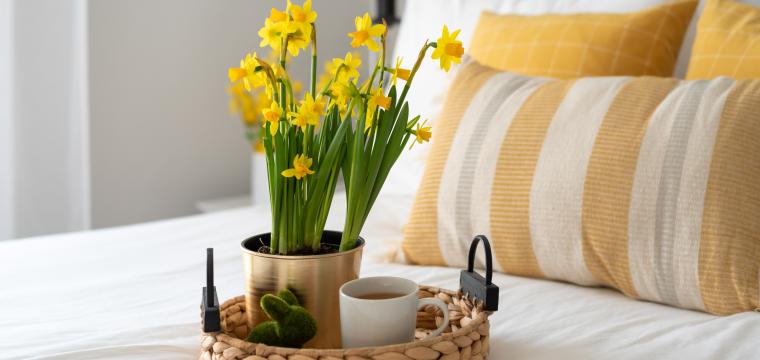Giving up the day job to run a bed and breakfast (B&B) is many people’s dream. It can allow you to be your own boss, work from home, meet interesting people, and do something you’re passionate about in a place you love. It can be a rewarding and profitable business when done right.
While starting a B&B business can be a rewarding venture, it requires careful planning and preparation. In this article, we’ll take you through some of the key things to consider and give some essential tips to help you get started. Firstly though, why should you consider Wales as the location of your B&B?
Tourism in Wales – why it’s a great place to start a B&B
With its natural beauty, rich cultural heritage, and tourism appeal, Wales might just be the perfect place to start a B&B.
In 2019, there were just under 10.7 million overnight domestic GB trips to Wales, and a survey by Visit Wales in 2022 shows that people love Wales when they visit.
Visitors were the most satisfied with the ‘quality of the natural environment’ (83% very satisfied), followed by ‘feeling of safety’ (80%), ‘cleanliness of beaches’ (77%), ‘the welcome you received’ (76%) and ‘places to visit’ (75%).
Is owning a bed and breakfast right for you?
Firstly, it’s crucial to consider whether owning a B&B business is actually right for you. There are many positives to running a B&B, but it’s also important to have realistic expectations and think about the impact it may have on your life.
For one thing, running a B&B can mean less privacy – if you’re a live-in owner then you might share your personal space with guests. And regardless of whether you live in the same building or close by, you’ll always need to be on call and available to your guests, to solve problems and answer their needs.
Running a successful B&B requires a combination of personal qualities, business acumen, and an understanding of the hospitality industry. Here are a few of the most important qualities and skills you’ll need, to help you determine if it’s right for you:
Customer service and communication skills. Are you a ‘people person’? This is crucial as you’ll be interacting with new people all the time. Providing excellent customer service is key to getting good reviews and repeat business
Attention to detail. Are you house-proud and meticulous when it comes to cleanliness?
Flexibility and adaptability. You should be prepared to handle unexpected situations, like last-minute requests or emergencies. You therefore need to be a good problem-solver and able to stay calm when things don’t go to plan
Physical fitness. If you handle most of the daily running of the B&B yourself, it can be a very physically demanding job, so bear your health and fitness in mind and consider what help you’ll need (and what this will cost).
Market research
If you’re planning to move to a new location to start a B&B, then you’ll need to thoroughly research different areas in Wales to determine the best place. If, on the other hand, you want to turn your existing home into a B&B, then you need to assess whether there is actually a demand where you live.
Some aspects to research include competition, nearby amenities, proximity to visitor attractions, and potential target markets. Find out the occupancy rates of other B&Bs in the area and what these establishments offer. Competition isn’t necessarily a bad thing, but make sure there’s enough demand for you to capitalise on, or a way for you to stand out. Perhaps there’s a particular market that isn’t already being served by competitors, presenting an opportunity.
Once you know your target market, you can set up a B&B that meets its needs. Are you mainly targeting couples, families, business travellers, international tourists? Are they on a budget or looking for luxury? The more you know about your ideal customer – their demographics, needs, and preferences - the better you can tailor your strategy and focus your marketing efforts.
Rules and regulations for running a bed and breakfast
While you won’t need any specific licences or qualifications to set up a B&B, there are various rules and regulations you’ll need to comply with to ensure your operation is legal and safe for guests.
As legal requirements are often being updated, we won’t go into too much detail on them, but we’ve listed a few key areas you should be aware of below.
Before you begin putting your plans in place, and if you’re ever in doubt concerning any business activities, it’s always advisable to get in touch with your local authority to make sure you’re in compliance with all requirements. It may also be worth joining industry associations, such as the Bed & Breakfast Association, or other networks for B&B owners, for guidance and resources.
Please note the following isn’t an exhaustive list.
Planning permission - check with your local planning authority through your local council to determine if your property is suitable for a B&B and if any permissions are required.
Fire safety. The Regulatory Reform (Fire Safety) Order 2005 is the main piece of legislation governing fire safety in Wales and England. Under this law, B&B owners must carry out a fire risk assessment.
Food safety. You’ll need to adhere to food safety regulations, including ensuring that your kitchen and food handling practices meet acceptable standards. You can find guidance on the Food Standards Agency website.
Licences. Depending on the activities you carry out, you may need certain licences, such as an alcohol licence, music licence, DVD concierge licence, or TV licence (a standard TV licence won’t suffice).
Taxation. Remember to register your B&B with HMRC for tax purposes and keep accurate records of your income and expenses.
Another key aspect to consider is insurance. It’s important to have comprehensive insurance in place to protect yourself in case anything goes wrong. A number of insurers offer specialist B&B insurance that can cover you for various eventualities, offering options such as buildings and contents cover, public liability, employers’ liability, and business interruption.
Budget planning and financing
Budgeting is crucial before starting your B&B. It will help you assess whether you have the necessary resources to launch, determine whether the business is financially viable, and make informed decisions, for example on pricing.
There are lots of costs involved in starting and running a B&B to consider, including:
- Property costs. If you don’t already own a suitable property, you’ll need to budget for either purchasing one or turning an existing property into a B&B. This could include, for example, making alterations to your kitchen to conform with food safety requirements.
- Furniture and décor. The furniture and bedding in guest rooms should be in good condition. You may also want to consider whether you want to add any in-room entertainment such as TVs, and also think about appliances like tea and coffee making facilities.
- Marketing. Remember to allocate funds for marketing to attract guests. Consider expenses for website development, online listings, and social media marketing or advertising.
- Insurance. As we mentioned before, it’s important to purchase comprehensive insurance coverage for your B&B.
- Staffing. You may choose to hire staff to help you with cooking, cleaning, maintenance, or other services.
- Taxes. Be prepared for taxes such as property taxes and income tax.
- Professional services. Don’t forget to budget for any help you might need from lawyers, accountants, or other professional services to make sure your B&B is compliant and cost-efficient.
- Other costs associated with the day-to-day running of the B&B. This includes things like utilities, cleaning supplies, and food supplies.
To plan your finances effectively, you should create a detailed business plan outlining your revenue projections and estimated expenses, and budget carefully. Consider getting help from a financial advisor or accountant with experience in the hospitality industry, as they may be able to provide valuable insights and help you make informed financial decisions.
It might be the case that you don’t have enough money yourself to cover costs and therefore need to secure financing. There are various options available, including small business loans. We’ve supported many hospitality businesses, including hotels and B&Bs like the Farmers Arms, with our business loans to help them start up or grow.
If you need finance to achieve your dream of starting a B&B or hospitality business in Wales, please get in touch with us.


